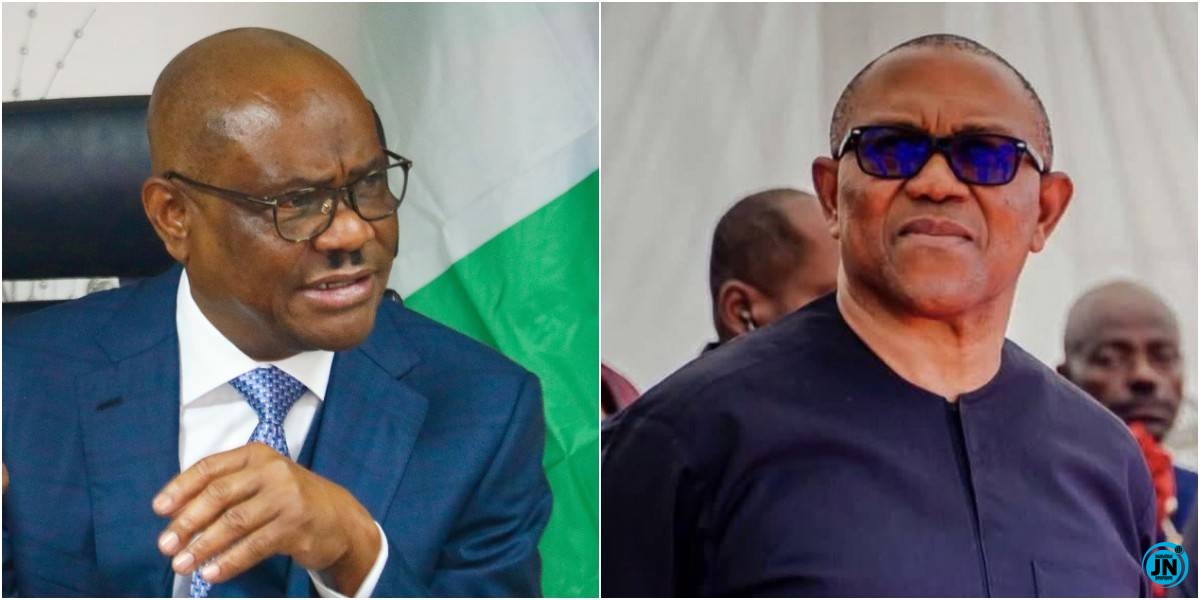
The Minister of the Federal Capital Territory, Nyesom Wike, has issued a stern warning to the Peoples Democratic Party (PDP), cautioning the leadership and members of the opposition party against the idea of reabsorbing former Labour Party presidential candidate, Peter Obi, into its fold ahead of the 2027 general elections. According to Wike, such a move would not only be politically unwise but could also spell the ultimate downfall of the party if pursued.
During a comprehensive media chat on Monday, the former Rivers State governor reflected on the turbulence that plagued the PDP in the buildup to the 2023 elections. He noted that the PDP leadership had failed to learn from its mistakes, especially on matters concerning zoning, inclusivity, and internal justice. Wike argued that the lack of fairness and disregard for balance in leadership positions had been a major factor in the party’s disastrous performance at the polls.
He recalled how he consistently raised objections when both the presidential candidate and the national chairman of the party were allowed to emerge from the northern region of the country. According to him, such a decision was not only unjust but also amounted to political recklessness that alienated a significant portion of the party’s base.
“From day one, I told my colleagues, PDP, you are shooting yourself. If you allow what is going on to continue, you’ll pay the price. And what did I say? You cannot have the presidential candidate at the same time as the national chairman of the party,” Wike recounted during the chat. “That was a fundamental error, and we all saw the consequences when the electorate reacted.”
The minister further accused the PDP leadership of “stealing” both the presidential ticket and the chairmanship, thereby creating what he described as an imbalance that “purged” the party and eroded trust among its loyal members. He argued that this brazen disregard for fairness was a primary reason why the party lost credibility in the eyes of the Nigerian electorate.
Reiterating his long-held belief in rotational leadership, Wike stressed that the presidency must, for the sake of national unity and equity, return to the South. He maintained that any attempt to disrupt this balance would once again put the PDP on a collision course with the Nigerian people.
On the issue of Obi’s possible return, Wike dismissed such speculations as laughable and dangerous. He insisted that the former Labour Party presidential candidate had openly denounced the PDP in the past, describing it as “rotten,” and therefore lacked the moral standing to come back simply for political ambition. According to Wike, any move to readmit Obi into the party would irreparably damage its credibility and reduce it to a platform where ambition outweighs ideology and principle.
“To what? Bringing Obi to where? You want to kill the party? Obi that was abusing the party, saying it is rotten—so the party is now good enough for him? Ambition can make people even go to Satan’s house,” Wike said pointedly, dismissing the idea as nothing short of suicidal for the PDP.
Wike further argued that Obi’s return would strip the PDP of any remaining ideological or principled foundation, effectively turning it into a political vehicle for personal ambition rather than a party rooted in fairness, equity, and justice. He emphasized that Nigerians would not be deceived by such maneuvers, warning that the electorate is increasingly alert to the inconsistencies and opportunism in political parties.
“If you want to destroy this party, dare it—bring Obi. There’s no way he will come back just because of ambition. No more ideology, no longer principle. That would be the end of what PDP claims to stand for,” Wike stated emphatically, drawing a line in the sand for the party leadership.
His comments have since stirred political debate across the country, with observers noting that Wike’s remarks highlight deep internal cracks within the PDP as it struggles to redefine its identity and strategy ahead of 2027. The statement also underscores the tension between ideology and ambition in Nigerian politics, where party loyalty often collides with personal interests and electoral calculations.